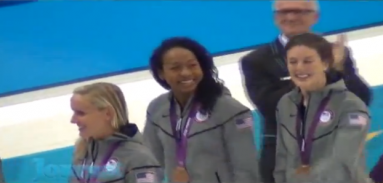One of the best things about blogging is "meeting" readers via comments, particularly those who can illuminate aspects of beauty that I haven't dealt with firsthand. So when Mary Elizabeth left a lengthy comment on my post about neck hair and joked about how she was now basically guest contributing, I happily took her up on it! Mary is a portrait artist and maybe a little bit of a wannabe writer currently residing in Cleveland, Ohio. Check out her art blog at Mary-Elizabeth.net.
I grew up on an island in Florida but I didn't learn to swim until I was 12. According to USA Swimming this isn't unusual for African Americans. I first learned this tidbit while working as a summer camp counselor; it was part of our training, which also included watching security camera footage of a male African American camper nearly drowning at the bottom of a pool. Yes, for real. The video was intended to drive home the point that we as counselors shouldn't rely on the lifeguards while at the pool, but the other not-so-subtle message was that black children often cannot swim and therefore needed to be watched even closer. This is a great example of just how ingrained the idea that all African Americans don't and/or can't swim is. But why?
If you ask the internet, it will tell you it's African American women who are to blame because we don't want to mess up our hair. Apparently, this is explanation enough since real reasons are almost never given and are oversimplified when they are. I rarely see not living near a body of water cited, for example. For me it was because I never wanted to learn until I made a friend with a backyard pool that had a slide I desperately wanted to use and not drown. I personally know many black women who can swim. Not only that, but I've seen them with my own eyes at public beaches and pools...hair dripping wet just like everyone else. And yet many other people present at those same public beaches and pools would rather dismiss what they've seen with their own eyes as some sort of anomaly rather than consider what they have come to understand as fact may in actuality be a stereotype.
So why don't some black women want to swim and mess up their hair? I think the answer is more complex than the simple vanity the stereotype implies, and has its roots in slavery. It's obvious that most slaves didn't have time or resources to care for their hair once enslaved, but in their homelands they would have had elaborate hair care rituals. Women (and men) styled their hair in elaborate and time-consuming ways. (In fact, in Africa during and before slavery a person wearing an Afro was uncommon and would have been considered mentally ill and ostracized.) Imagine how awful it must have felt to not be able to care for your hair while remembering the sense of pride you once took in it. As families and tribes were split up and sold, hair care practices were lost and possibly even replaced by the hair care practices of white slaveholders. Needless to say, these practices didn't work for the tightly curly hair that many slaves possessed. To add insult to injury, slaves who worked in their owners’ houses were often required to cover their hair, as it was considered unsightly, while slaves with less curly hair types weren't required to do so—and were often treated better. The divide this created amongst slaves is very likely the root of the modern “good hair” vs. “bad hair” debate. Once freed, many straightened their hair with heat or chemicals—not to look more white (although I am sure there were those who did) but to have one less thing to make them stand out as "other" in a society that just barely accepted them.
Today many African American women opt to keep their hair natural and only straighten their hair temporarily with heat. I don't think I have to explain to anyone reading what a little humidity, let alone a splash from the pool, can do to flatironed hair...and if it takes you 2+ hours to flatiron the curls out of your hair like it does in my case, you're probably not going to go near any water and make all that work for naught. So there's part of the answer, although it's a little simplified in the interest of not boring you to death with the details of curly hair types, heat straightening, and the inherent fragility of curly hair. There are also some who opt to relax their hair, which is a chemical treatment that breaks the disulfide bonds in the hair strand, making it less curly—but it can also make the hair "bone straight" if left to process long enough. Relaxing the hair makes it more susceptible to chlorine and salt water damage just like color treated hair. These two reasons are enough to dispel or at least explain how the stereotype started, but they're just the more obvious ones that I know of. Maybe some African American women just don't have any interest in swimming and their hair provides a convenient excuse...what with a stereotype already in place to support it and all. Seriously, though, these reasons could apply to a woman of any race who avoids swimming. Nowadays it's common for women of all races to use heat and chemicals to straighten (or curl) their hair, so it's pretty ridiculous to pretend it's only one racial group that’s concerned about their hair and what effect swimming might have on style or health.
